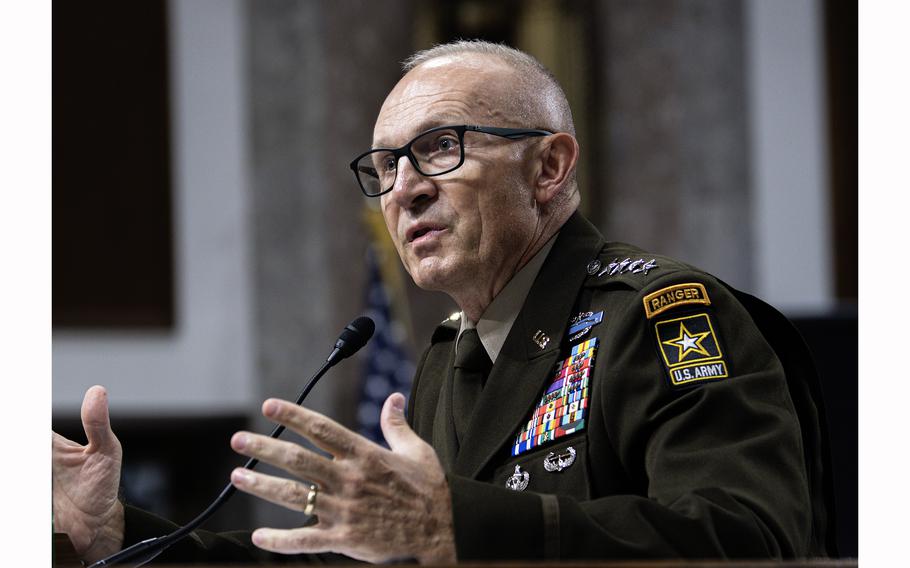
Army Gen. Randy George answers questions Wednesday, July 12, 2023, during a Senate Armed Services Committee hearing on Capitol Hill in Washington, D.C., to consider his nomination to be the service’s next chief of staff. (Carlos Bongioanni/Stars and Stripes)
WASHINGTON — Gen. Randy George, the Army vice chief of staff who is slated to become the service’s top officer, said Wednesday that he will promote the value of serving as the Army faces another recruiting shortfall.
The service is expected to miss its recruitment goal by 30% this year, continuing a worrying trend that George told the Senate Armed Services Committee he would strive to reverse if confirmed to the Army’s highest-ranking post.
“We have to get after perception,” George said. “The Army is a great place to serve, I know that, I believe that with all of my heart, and we’ve got to get that out there.”
George said he joined the Army out of high school as a junior enlisted soldier to earn money for college but stayed “because of the mission and people.” In 1988, he commissioned from the U.S. Military Academy at West Point, N.Y., as an infantry officer.
A Korean War veteran helped inspire George’s military career, and the general said such influence was needed for the next generation of soldiers. He said teachers and coaches need to emphasize to young people that the Army is a “life accelerator.”
An Army survey released in February showed the top reason Americans declined to enlist is the fear that they would be putting their life on hold. About 13% cited a belief that women and racial and ethnic minorities are discriminated against in the service.
George said that perception necessitates the diversity and inclusion training that many Republican lawmakers deride as unnecessary liberal initiatives that weaken the force.
“[It’s] part of building a cohesive team and bringing everybody together,” George said in defense of the training. “We absolutely have to do that.”
Republicans have placed some of the blame for the military’s recruiting crisis on what they say is a preoccupation with race, gender and other “woke” issues that marginalize potential recruits with conservative beliefs. But the Army poll indicated only 5% of respondents cited “wokeism” as a reason they did not want to serve.
George said he wanted to focus on the Army’s marketing efforts, which aim to appeal to a broad array of prospective applicants but must also include messaging tailored to individual communities.
“We’re [all] different,” he said. “We want to come from across society.”
The potential recruiting pool will be limited, nonetheless. Most young people, about 77%, are not qualified to serve due to physical or academic deficiencies.
George said that number is dropping, however, partly due to the success of the Army’s Future Soldier Preparatory Course. The program helps potential recruits become fitter and improve their test scores to meet Army requirements.
“We want people to meet our standard and we want them to know we’re willing to help them meet that standard,” George told senators.
The Army’s ongoing struggle to fill its ranks is one of several challenges that George will have to contend with as Army chief of staff. He also would be charged with overseeing the service’s modernization to better counter threats posed by China and Russia.
George has served in his current job since August and previously worked as the senior military assistant to Defense Secretary Lloyd Austin. He has extensive combat experience, including service in the Gulf War, Iraq War and the war in Afghanistan.
He led a brigade of 4th Infantry Division soldiers in Afghanistan in 2009 and returned in 2017 to command the entire 4th Infantry Division. As a brigadier general in 2015, George helped spearhead the Army’s response to Russia’s initial invasion of Ukraine by leading a new mission command overseeing soldiers on NATO’s eastern flank.
George is set to replace outgoing Gen. James McConville, who will retire in August as the Army chief of staff after a four-year term.
“Gen. George is the right man for this job,” said Republican Sen. Joni Ernst, who represents George’s home state of Iowa.
George's promotion likely will face delays as Sen. Tommy Tuberville, R-Ala., continues to obstruct the confirmation of about 250 military officer nominees, including the commandant of the Marine Corps. Tuberville began his blanket hold on military promotions in the spring as protest over the Pentagon's reproductive health policies.